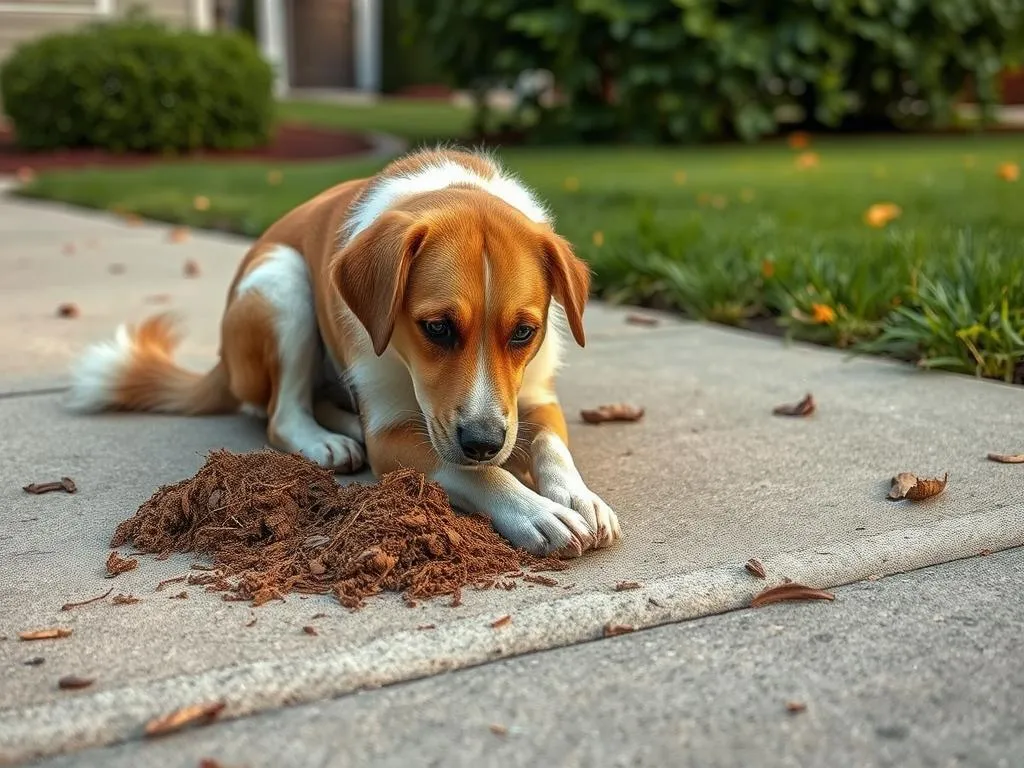
Dog nutrition plays a pivotal role in maintaining your furry friend’s overall health and well-being. The food you provide directly impacts not only their energy levels and coat quality but also their bowel habits. This brings us to a common concern among dog owners: why does my dog poop on concrete? Understanding the connection between a dog’s diet, digestion, and elimination habits can help us address this question effectively.
Understanding Dog Digestion
The Digestive System of Dogs
To comprehend how nutrition influences bowel habits, it’s essential to understand a dog’s digestive anatomy. Dogs possess a simple yet efficient digestive system that comprises:
- Mouth: The process begins as food is ingested and mixed with saliva.
- Esophagus: This muscular tube transports food to the stomach.
- Stomach: Here, food is mixed with gastric juices, breaking it down into a semi-liquid form.
- Small Intestine: Nutrients are absorbed in the small intestine, with the help of enzymes produced by the pancreas and bile from the liver.
- Large Intestine: This organ absorbs water and electrolytes and compacts the waste into feces before elimination.
Nutritional Requirements for Dogs
Dogs require a balanced diet rich in key nutrients to support their health. The primary nutrients include:
- Proteins: Essential for muscle repair and growth.
- Fats: Provide energy and support cell function.
- Carbohydrates: Serve as a primary energy source.
- Vitamins and Minerals: Crucial for various bodily functions, including bone health and immune response.
A balanced diet tailored to a dog’s specific age, breed, and activity level ensures optimal health and can positively influence bowel habits.
Common Reasons for Unusual Bowel Habits
Dietary Factors
One significant factor that can impact bowel health is diet. Poor nutrition can lead to various gastrointestinal issues, causing irregular bowel movements. Key dietary issues include:
- Low-Quality Food: Foods with fillers and low nutritional value can disrupt digestion.
- Sudden Diet Changes: Abruptly switching a dog’s diet can cause stress on their digestive system, leading to diarrhea or constipation.
Health Issues
Beyond diet, various health conditions can affect a dog’s bowel movements. Some potential medical issues include:
- Gastrointestinal Disorders: Conditions like inflammatory bowel disease or parasites can cause irregularities.
- Signs of Gastrointestinal Problems: Look for symptoms such as vomiting, discomfort, or changes in appetite, which may indicate underlying health issues requiring veterinary attention.
Behavioral Aspects
Stress and anxiety can also influence a dog’s bathroom habits. Dogs thrive on routine, and any disruption can lead to behavioral changes. Factors to consider include:
- Environmental Changes: Relocation or new family members can induce stress.
- Lack of Routine: Inconsistent feeding and bathroom schedules may confuse dogs about when and where to relieve themselves.
Why Does My Dog Poop on Concrete?
Environmental Preferences
One of the intriguing aspects of dog behavior is their preference for certain surfaces when it comes to elimination. Many owners find themselves asking, why does my dog poop on concrete? Several factors can influence this behavior:
- Sensory Factors: Dogs are highly attuned to their environment. The texture and temperature of concrete may feel more comfortable or familiar to them compared to grass or dirt.
- Hard Surfaces: Some dogs may prefer solid ground for pooping as it provides stability, making them feel safer during the act.
Training and Conditioning
Training plays a crucial role in shaping a dog’s bathroom habits. Dogs learn through experience, and previous conditioning can significantly impact their preferences. For instance:
- Previous Experiences: If a dog was frequently taken to a concrete surface for elimination during their training, they might continue to associate that area with the act of pooping.
- Consistency in Training: Dogs thrive on routine. If they are consistently taken to the same area, they may develop a strong preference for that location.
Health Implications
While some dogs may simply prefer to poop on concrete, it’s essential to consider any potential health implications. If your dog exhibits a sudden change in their bathroom habits, it might indicate an underlying health issue. Consult a veterinarian if:
- Changes in Consistency or Frequency: Notable shifts could signal gastrointestinal problems.
- Signs of Discomfort: If your dog seems to struggle or shows signs of pain while eliminating, a veterinary check-up is warranted.
Nutritional Solutions to Improve Bowel Health
Choosing the Right Dog Food
Selecting high-quality dog food can significantly impact your dog’s digestive health. Here are some key ingredients to look for:
- Whole Proteins: Look for real meat as the first ingredient.
- Healthy Fats: Omega fatty acids support skin and coat health.
- Fiber: Essential for healthy digestion, fiber helps regulate bowel movements.
Supplements for Digestive Health
In addition to quality dog food, certain supplements can aid in maintaining a healthy digestive system:
- Probiotics: These beneficial bacteria support gut health and can alleviate issues like diarrhea.
- Digestive Enzymes: They help break down food more efficiently, enhancing nutrient absorption.
When considering supplements, consult with a veterinarian to ensure they are appropriate for your dog’s needs.
Homemade Diets: Pros and Cons
Some pet owners opt for homemade diets as a way to control their dog’s nutrition. While this approach has benefits, it comes with risks:
- Benefits: Homemade meals can be tailored to meet specific dietary needs and preferences.
- Risks: It can be challenging to ensure a balanced diet, leading to nutritional deficiencies. Always consult a veterinarian before making significant changes to your dog’s diet.
Establishing Healthy Bathroom Habits
Creating a Routine
Establishing a consistent routine is essential for encouraging healthy bathroom habits. Here are some tips:
- Regular Feeding Schedule: Feed your dog at the same times each day to regulate their digestive system.
- Bathroom Breaks: Take your dog out for bathroom breaks at consistent intervals to reinforce the habit.
Positive Reinforcement Training
Positive reinforcement is an effective training technique that encourages desired behaviors. Apply these strategies to promote good bathroom habits:
- Rewards and Praise: Offer treats or verbal praise when your dog eliminates in the desired location.
- Patience and Consistency: Remain patient and consistent, as it may take time for your dog to adapt to new habits.
Monitoring and Adjusting
Keeping track of your dog’s bowel movements and dietary changes is crucial for maintaining digestive health. Here’s how to monitor effectively:
- Observe Patterns: Note any changes in frequency or consistency of bowel movements.
- Adjust Diet as Needed: If you notice irregularities, consider adjusting your dog’s diet and consulting a veterinarian for advice.
Conclusion
Understanding the intricacies of dog nutrition and its connection to bowel habits is essential for every dog owner. From ensuring a balanced diet to creating a routine and training for proper bathroom habits, each aspect plays a vital role in your dog’s overall health. Observing your dog’s habits and making informed dietary choices can lead to healthier, happier pets. If you ever find yourself pondering why does my dog poop on concrete, remember that various factors, including nutritional quality and environmental preferences, contribute to this behavior.
By prioritizing proper nutrition and establishing healthy routines, you can help your furry friend thrive and enjoy a fulfilling, healthy life.









